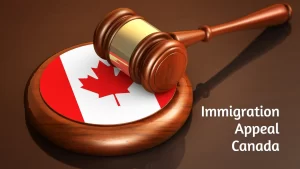Immigration Appeal in Toronto

Immigration Appeal in Toronto: A Comprehensive Guide
Introduction
Immigration is a life-changing journey, but the process is not without challenges. When immigration applications are denied or deemed incomplete, applicants may feel disheartened. However, Canada's immigration system offers recourse through the immigration appeal process.
For individuals in Toronto and across Canada, immigration appeals provide a legal avenue to challenge decisions made by Immigration, Refugees, and Citizenship Canada (IRCC) or the Canada Border Services Agency (CBSA). This guide explores the types of immigration appeals, the processes involved, and the resources available to applicants in Toronto.
1. Understanding Immigration Appeals
Immigration appeals are formal procedures allowing individuals to contest decisions on immigration applications. Appeals are handled by the Immigration Appeal Division (IAD) of the Immigration and Refugee Board of Canada (IRB).
a) Reasons for Immigration Appeals: Immigration Appeal in Toronto
An appeal may be necessary if:
- A sponsorship application for a family member is refused.
- Permanent residency is revoked.
- A removal order is issued to a permanent resident or refugee.
- Residency obligations are deemed unmet.
b) Who Can File an Appeal?
Appeals can be filed by individuals, sponsors, or representatives, depending on the nature of the case. For example, Canadian citizens or permanent residents sponsoring a family member can appeal a sponsorship refusal.
2. Types of Immigration Appeals
There are several types of appeals, each addressing specific immigration issues.
a) Family Sponsorship Appeals
When a sponsorship application is refused, sponsors can appeal the decision to the IAD. Common reasons for refusal include insufficient documentation, doubts about the genuineness of the relationship, or the ineligibility of the applicant.
b) Removal Order Appeals: Immigration Appeal in Toronto
Permanent residents, refugees, or foreign nationals issued a removal order can appeal the decision if they believe it was made in error or if exceptional circumstances apply.
c) Residency Obligation Appeals
Permanent residents who fail to meet the residency requirement of staying in Canada for at least 730 days within a five-year period may face a loss of status. An appeal can be filed to contest the decision based on humanitarian and compassionate grounds.
d) Appeals for Loss of Permanent Residency
Permanent residents facing revocation of status due to misrepresentation or non-compliance with immigration laws can appeal to the IAD for reconsideration.

3. The Immigration Appeal Process: Immigration Appeal in Toronto
The appeal process involves multiple stages, each requiring careful preparation and legal expertise.
a) Filing an Appeal
- Appeals must be filed within a specific timeframe after receiving the decision (e.g., 30 days for sponsorship appeals).
- Applicants must submit a Notice of Appeal to the IAD.
b) Case Review
The IAD reviews the appeal to determine if it meets the criteria for a hearing. Additional evidence or documentation may be requested.
c) Alternative Dispute Resolution (ADR)
In some cases, the IAD offers an ADR process to resolve the issue without a formal hearing. ADR is a less formal and faster method of addressing concerns.
d) Appeal Hearing
If the appeal proceeds to a hearing, it is held before a member of the IAD.
- Both parties present evidence and arguments.
e) Decision
The IAD issues a written decision after the hearing, either allowing or dismissing the appeal. If the appeal is allowed, the original decision is overturned, and the application can proceed.
4. Grounds for Immigration Appeals
a) Legal Errors: Immigration Appeal in Toronto
Applicants can argue that the immigration officer made an error in law or misapplied immigration regulations.
b) Procedural Fairness
Appeals can highlight breaches of procedural fairness, such as inadequate consideration of evidence or failure to provide an opportunity for a response.
c) New Evidence
Presenting new evidence that was not available at the time of the initial decision can strengthen an appeal.
d) Humanitarian and Compassionate Grounds
In some cases, appellants may cite exceptional circumstances, such as family hardship, medical conditions, or adverse impacts on dependents.
5. Challenges in Immigration Appeals: Immigration Appeal in Toronto
The appeal process is complex and time-consuming, with potential obstacles, including:
a) Strict Deadlines
Missing deadlines for filing appeals or submitting documents can result in dismissal.
b) Burden of Proof
The appellant must provide compelling evidence to overturn the original decision.
c) Language Barriers
Non-English-speaking applicants may face difficulties in preparing appeals or presenting their case.
d) Emotional and Financial Strain
The lengthy appeal process can take a toll on individuals and families, both emotionally and financially.

6. Legal and Community Support in Toronto: Immigration Appeal in Toronto
Toronto offers numerous resources to assist individuals navigating the immigration appeal process.
a) Immigration Lawyers and Consultants
Hiring an immigration lawyer or licensed consultant can significantly improve the chances of a successful appeal. These professionals provide:
- Case assessment and strategy development.
- Assistance in preparing documentation and evidence.
- Representation at hearings.
b) Legal Aid Ontario
Low-income individuals may qualify for legal aid to cover the costs of an immigration lawyer.
c) Settlement Agencies
Organizations like IEC Immigration and Refugee Center offer support services, including translation, documentation assistance, and legal referrals.
d) Community Advocacy Groups
Groups such as the IEC Immigration and Refugee Center advocate for immigrants and refugees, offering guidance and support throughout the appeal process.
7. Tips for a Successful Immigration Appeal: Immigration Appeal in Toronto
a) Understand the Decision
Carefully review the refusal letter or removal order to understand the reasons behind the decision.
b) Gather Strong Evidence
Compile all relevant documents, such as:
- Relationship proof for sponsorship appeals.
- Residency records for residency obligation appeals.
- Medical or financial hardship evidence for humanitarian appeals.
c) Seek Professional Assistance
Engaging an experienced immigration lawyer or consultant ensures that your appeal is prepared and presented effectively.
d) Stay Organized
Maintain a detailed record of correspondence, deadlines, and submissions related to the appeal.
8. Alternatives to Immigration Appeals: Immigration Appeal in Toronto
In some cases, filing a new application or seeking judicial review may be more appropriate than pursuing an appeal.
a) Judicial Review
Applicants who believe the original decision involved an error of law or procedural fairness can request a judicial review by the Federal Court of Canada.
b) Reapplication
If circumstances have changed, or new evidence is available, reapplying for the original immigration program may be a viable option.
Conclusion
The immigration appeal process in Toronto provides a vital lifeline for individuals seeking to challenge unfavorable decisions. While the process can be daunting, understanding the types of appeals, seeking professional guidance, and utilizing community resources can significantly enhance the chances of success.
Toronto’s robust legal framework and supportive community networks underscore Canada’s commitment to fairness and inclusivity, offering hope to those striving for a brighter future in their new home.
In case, if you need help with Immigration Appeal in Toronto or other legal support, please fill in application below or contact us directly.

